You may find below the FIP publications focusing on self-care

Publications on self-care
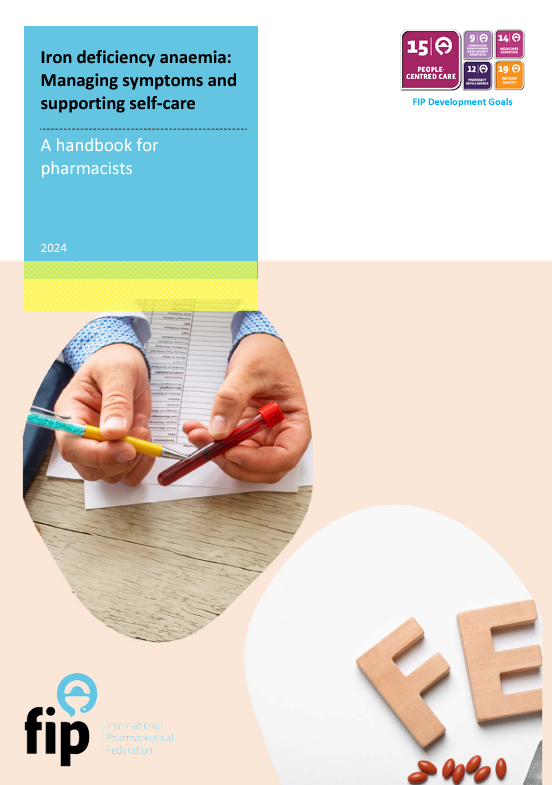
Iron Deficiency Anaemia: Managing symptoms and supporting selfcare. (2024)
This handbook provides pharmacists with the latest insights into iron deficiency anaemia, drawing on collective evidence and recommendations from existing guidelines and expert consensus. It addresses not only pharmacological treatment and non-pharmacological interventions but also prevention strategies. Additionally, the handbook covers guidelines for managing iron deficiency anaemia (IDA) in special populations, including paediatrics, non-pregnant women of reproductive age, pregnant women and breastfeeding mothers, the elderly, patients with chronic diseases, and individuals on strict diets. Overall, this handbook serves as an invaluable resource for pharmacists in managing IDA, underpinning the importance of pharmacists’ role in screening, managing, treating, patient education, and holistic self-care practices.
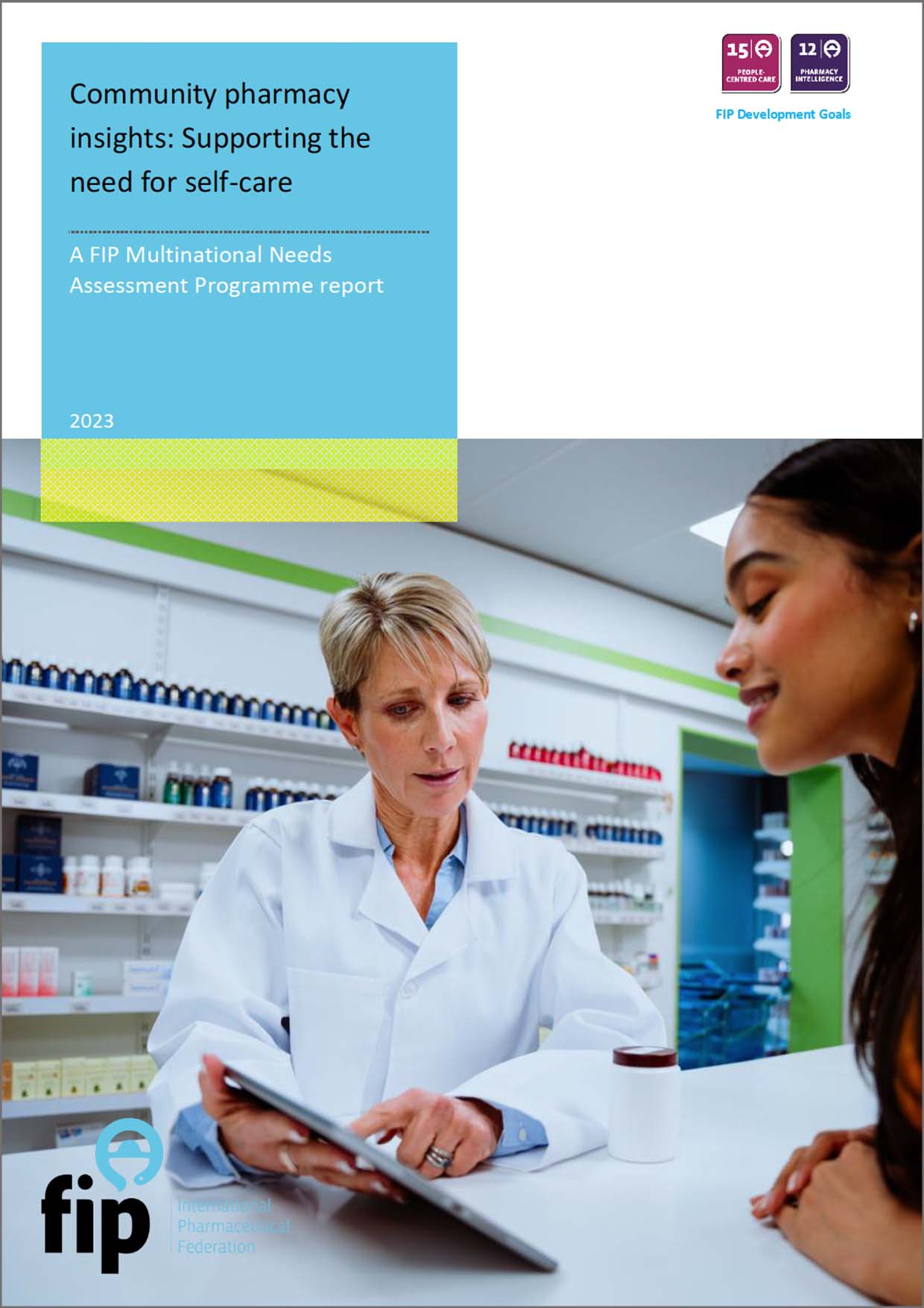
Community pharmacy insights: Supporting the need for self-care. A FIP Multinational Needs Assessment Programme report (2023)
This report took evidence from both an online questionnaire and short interviews aimed at describing pharmacists’ understanding of self-care. The report assesses further needs related to education and training and investigates the role of pharmacists in using digital self-care tools and healthcare technologies. It also captures insights into support that patients need from the community pharmacy team to manage their own self-care conditions.
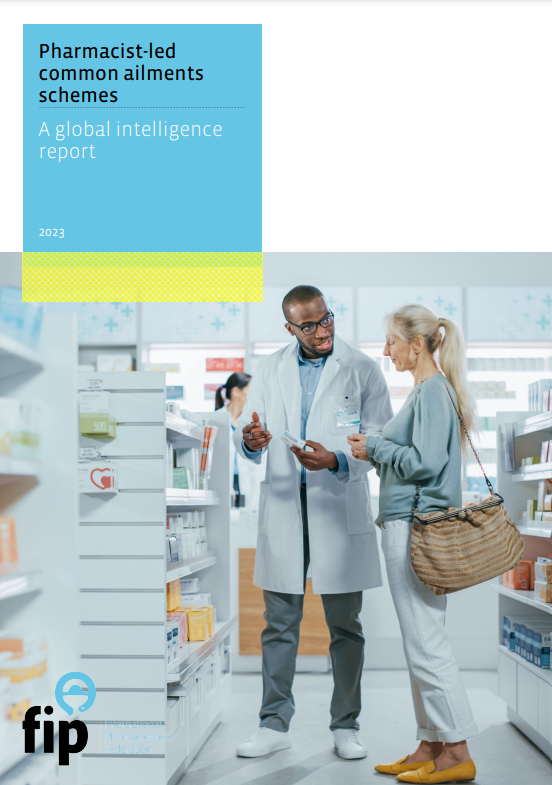
Pharmacist-led common ailments schemes: A global intelligence report. (2023)
The escalating global demand for health care, primarily attributed to ageing populations and the surge in chronic, long-term non-communicable diseases, stresses the importance of managing common ailments within primary healthcare settings, and highlights the essential role that pharmacists can play in the prevention and management of such ailments. With limited access to general practitioners and emergency departments, patients increasingly rely on the accessibility and competence of community pharmacists as their initial healthcare touchpoint. In response, countries such as the United Kingdom and Canada initiated common ailment schemes (CAS) in the early 2000s, delivering evident clinical and economic advantages, as well as improved convenience and access to care, by easing general practice burdens.
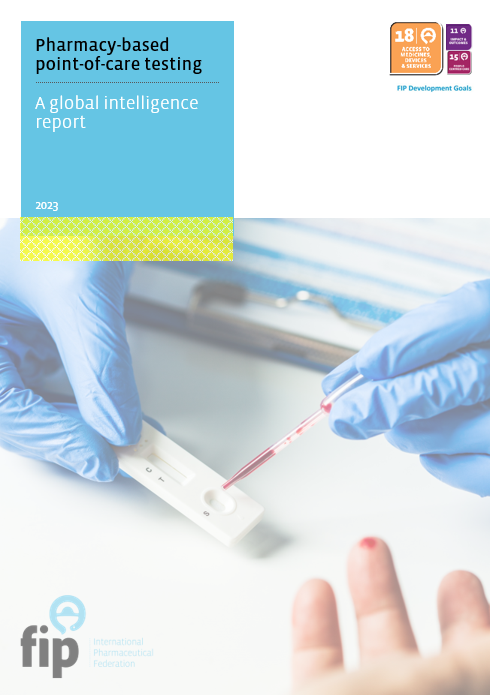
Pharmacy-based point-of-care testing: A global intelligence report. (2023)
“Pharmacy-based point-of-care testing: A global intelligence report” brings together evidence from a literature review, findings from a survey of 25 countries, 11 case studies, and the discussion of a FIP insight board, giving an overview of pharmacist-led POCT interventions around the world. POCT services, which include a wide range of tests to identify, diagnose, assess and/or monitor indicators of health, are strongly correlated with positive health outcomes. They are also linked to economic savings, increased health system efficiency and reduced burden on other healthcare sectors, the authors say. The report gives examples of POCT services being linked to prescribing authority by pharmacists, contributing to reducing pressure on general practice and emergency departments.
This document is available in:
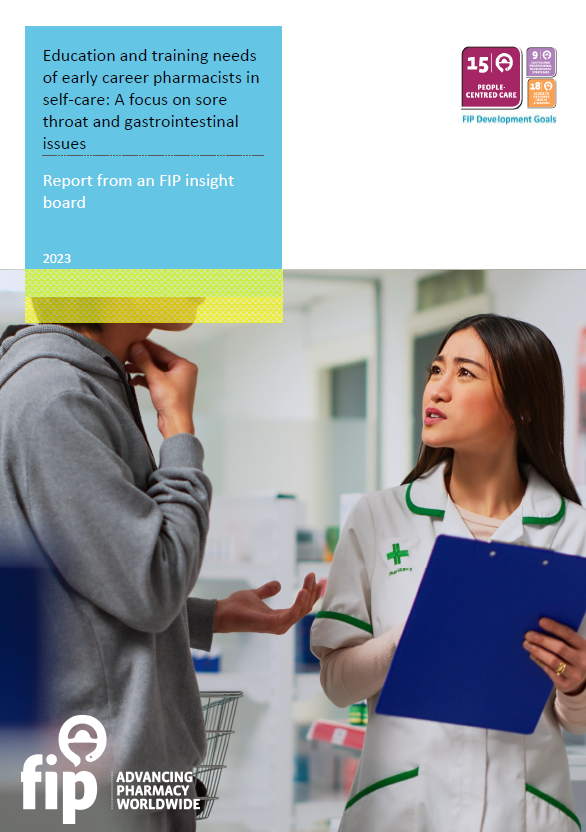
FIP insight board on the education and training needs of early career pharmacists in self-care (2023)
The insight board took place in September and explored the perspectives of early career pharmacists on the barriers and facilitators related to supporting people to self-manage sore throat and gastrointestinal conditions — which are among the most commonly encountered presentations in community pharmacy. Another aim was to identify the professional development that these colleagues needed to support them to help people improve or maintain good health through guiding self-care behaviour.

The role of pharmacists in relation to natural health products. Report from an international insight board. (2023)
In recent years, there has been a significant shift in consumer preferences wards natural approaches to healthcare. This trend has been driven by a degree of scepticism or dissatisfaction in relation to conventional medicines and their associated costs, as well as the perception that natural substances are less harmful than conventional medicines. This growing trend has led individuals to seek alternatives to conventional medicines and to explore various natural approaches to the management of their health.
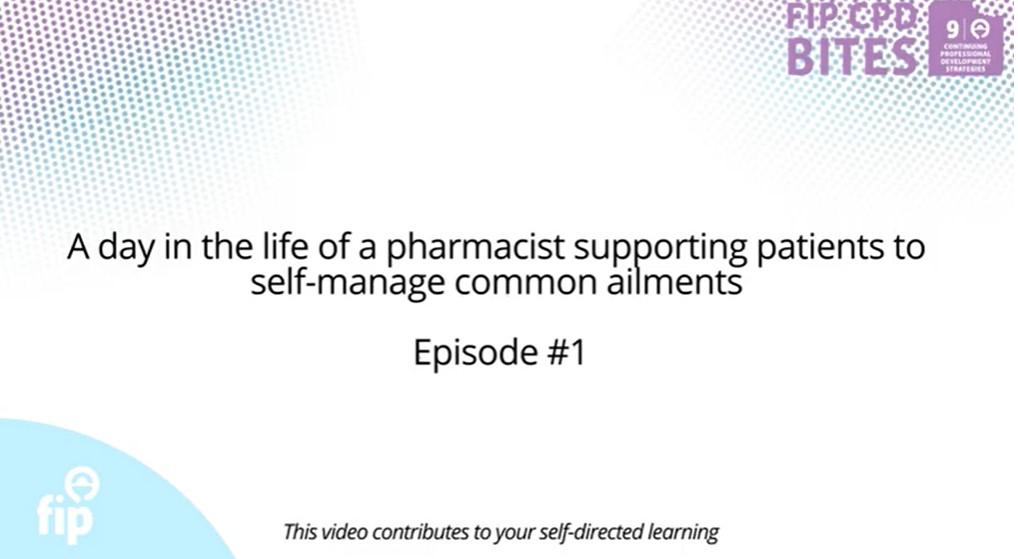
CPD bites: A day in the life of a pharmacist supporting patients to self-manage common ailments (2023)
This series will deliver six episodes of CPD bites presenting experiences and views of six pharmacists, from six different countries/regions discussing pharmacists’ role and experience in supporting patients’ self-care/self-manage commonly experienced ailments such as common cold, sore throat, flu, reflux, skin infections, or urinary tract infections. The series will cover the importance of customer satisfaction; patient reassurance; patient loyalty; diagnostic service provision; patient empathy; counter staff training; patient triage; and interactions with physicians in self-care

Identifying pharmacy-led actions for improving health literacy: Report from an international advisory roundtable (2023)
Of FIP’s 21 Development Goals, FIP DG 10 (Equity and equality) impacts us all. It calls for clear strategies to address inequalities in the pharmaceutical workforce, as well as to widen access and equity of pharmaceutical care services and access, and equity in global capacity in pharmaceutical sciences development. Health literacy is one of the key factors for achieving health equity and equality, and it is universally acknowledged that low health literacy is a barrier to better health and to achieving inclusivity and equity in health. The COVID-19 pandemic has exacerbated and deepened existing health inequities and has also revealed that a large part of them is rooted in education and literacy levels.

Health inclusivity, agency and empowerment: Developing solutions to help pharmacists drive better health outcomes: Report from an international insight board (2023)
The United Nations Sustainable Development Goal 3 (Good health and well-being) seeks to “ensure healthy lives and promote well-being for all at all ages”. Achieving this goal and universal health coverage cannot be achieved without equitable and inclusive access to health care, in our case, pharmaceutical care. A symposium with the theme “Health inclusivity and the role of pharmacy” took place during FIP's 80th World Congress of Pharmacy and Pharmaceutical Sciences in Seville, Spain, in 2022. Equitable and inclusive access to health care is necessary if universal health coverage SDG3 are to be achieved. With the belief that pharmacists can meaningfully influence and improve health outcomes through inclusivity and inclusion, expert speakers from The Economist, leading pharmacists and academics discussed how pharmacy can play a leading role in driving health inclusivity
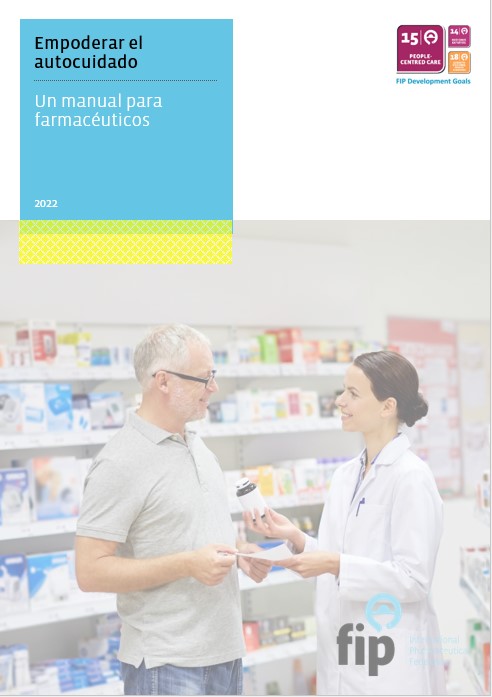
Empoderar el autocuidado: Un manual para farmacéuticos (2022)
Apoyar y facultar a las personas para que participen responsablemente en el autocuidado es una parte importante de la práctica diaria de los farmacéuticos en todo el mundo. El autocuidado abarca todo el espectro del bienestar desde la prevención de enfermedades hasta la gestión de síntomas y dolencias comunes. También abarca intervenciones, que van desde el asesoramiento sobre medicamentos sin receta y dispositivos médicos (a menudo descritos como "de venta libre") hasta la educación sobre dietas saludables, higiene y prácticas de atención plena.1 La capacidad de participar en el autocuidado faculta a las personas para actuar sobre su propia salud y bienestar y fomenta la inclusión de sus aportes y necesidades específicas, al tomar decisiones del cuidado de la salud. El autocuidado faculta a las personas y las sociedades para transformar la salud. Además, para promover la equidad en materia de salud, se necesita alfabetización sanitaria y existe un considerable margen de mejora y de mayor investigación en este campo.
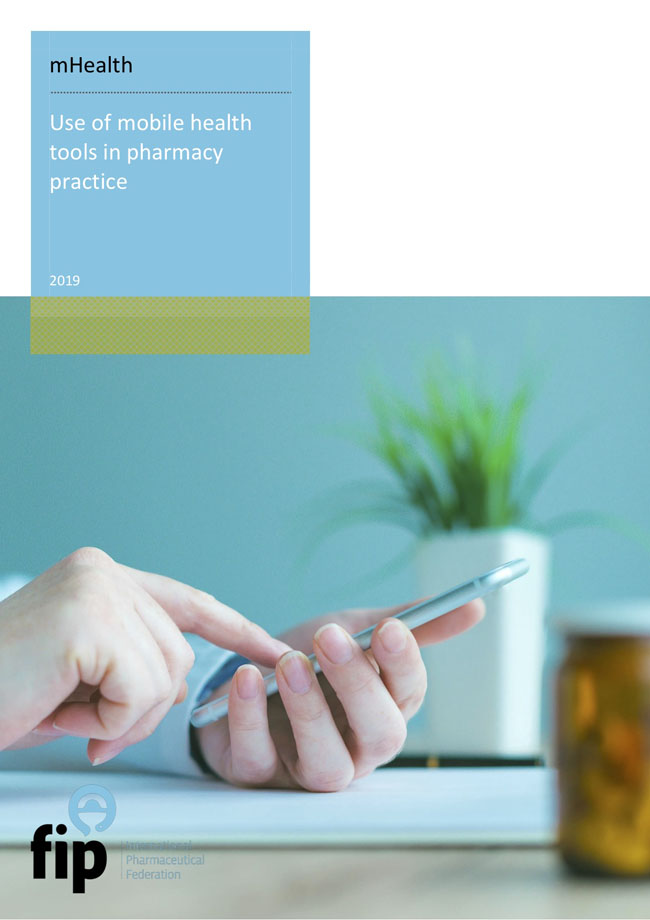
mHealth: Use of mobile health technologies in pharmacy practice (2019)
In a world of constant technological advances, it is important that healthcare professionals make use of technology to support patients and provide health care to ensure an optimal quality of life. Mobile health (mHealth) uses mobile technologies to assist healthcare professionals in providing efficient and adequate patient care. Mobile applications play an important role in mHealth, as they allow users to access information quickly, at the touch of a finger. This report discusses how mHealth assists pharmacists in providing patients with the best care possible. Through the use of mobile applications, pharmacists can stay up to date with disease state guidelines, maintain adequate pharmacy stock inventories, access drug information systems, review patient health information and use tools to calculate individual drug doses and to accurately convert between units of measurement. Mobile devices may also assist pharmacists by converting smart phones into point-of-care diagnostic tools, such as otoscopes or blood pressure monitors. Mobile applications can also help patients manage disease states, improving their medication adherence, and logging important health history. mHealth mobile applications have the ability to support pharmacy practice, as well as patients’ lives. Although mHealth is constantly advancing in global health care, patient confidentiality risks, variable IT literacy and internet access requirements are barriers that stand between patients/healthcare providers and the ability to fully take advantage of mHealth technologies. The goal of mHealth in the field of pharmacy should be to support and assist individuals in providing safe, effective and efficient patient-centred care.
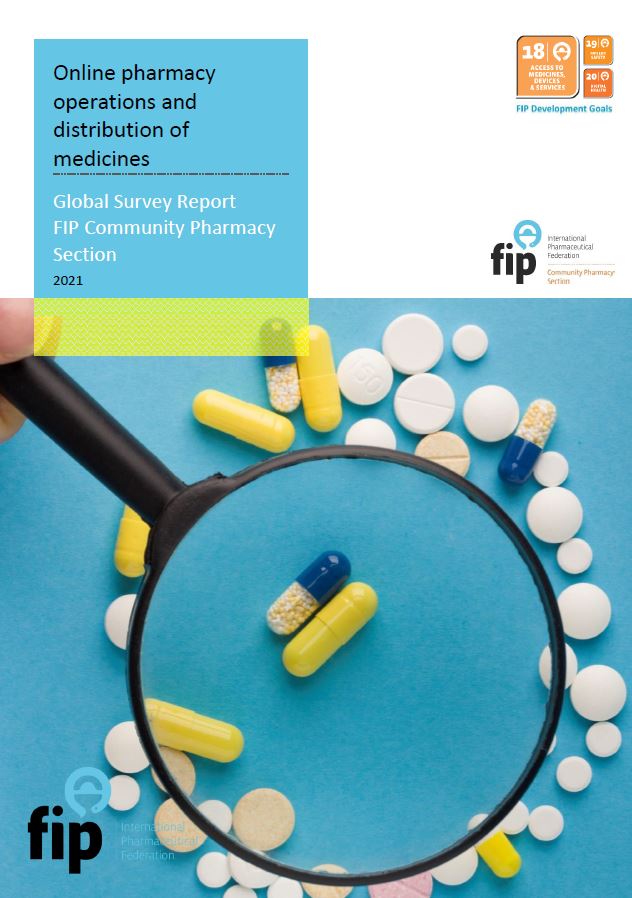
Online pharmacy operations and distribution of medicines. Global Survey Report FIP Community Pharmacy Section (2021)
The aim of the study was to provide a global snapshot of online pharmacy operations and the distribution of medicines on the internet; determine how online pharmacy operations may impact patient safety; and determine the impact of online pharmacy sales (actual or perceived) on brick-and-mortar pharmacies.
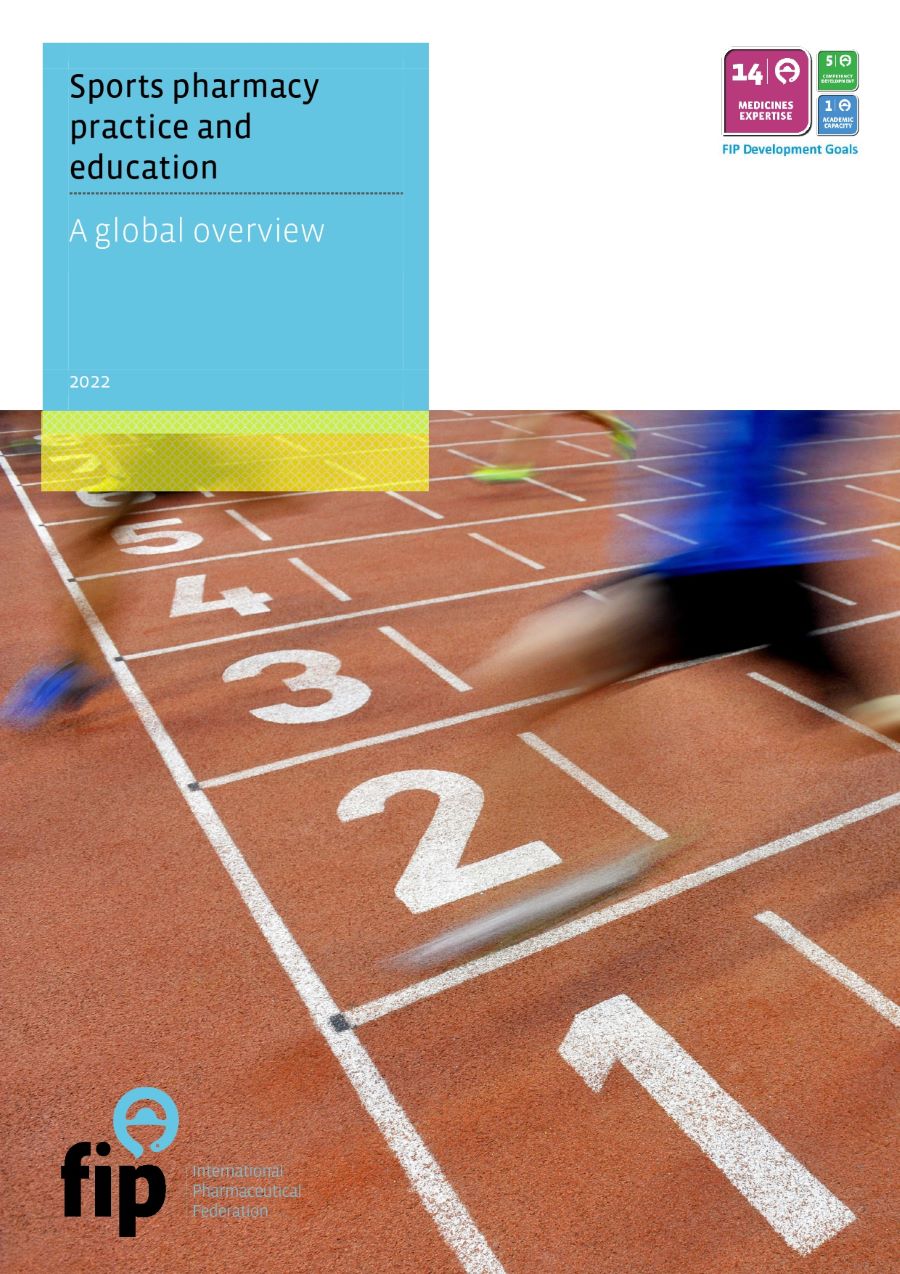
Sports pharmacy practice and education: A global overview
Inspired by the athletes themselves, their athleticism, and the spirit of competitive sport, pharmacists have become key players as athlete support personnel (ASP). As ASP, pharmacists support appropriate medication selection and provision of medicines management in the healthcare of athletes and pharmacy operations of sporting events. Increasingly recognised within the world of sports as a valuable expertise, the practice is known as “sports pharmacy”. The specialty of sports pharmacy is no longer a niche area but is one gaining traction as a recognised specialty on a global scale. Sports pharmacists advocate the health of recreational or competitive athletes in many settings and have been integral to the anti-doping movement. Pharmacists, as the most accessible healthcare provider, and often a first point of contact in the self-care continuum, have a unique and important role in providing accurate medicines-related information to athletes and the athlete support team to avoid inadvertent doping and adverse drug events, and support and review appropriate prescribing where applicable. This requires awareness of sports science, anti-doping rules and regulations, and physiopharmacology. Initial training through undergraduate studies and advanced training through continuing professional development in these areas facilitate pharmacist competency to function as ASP.
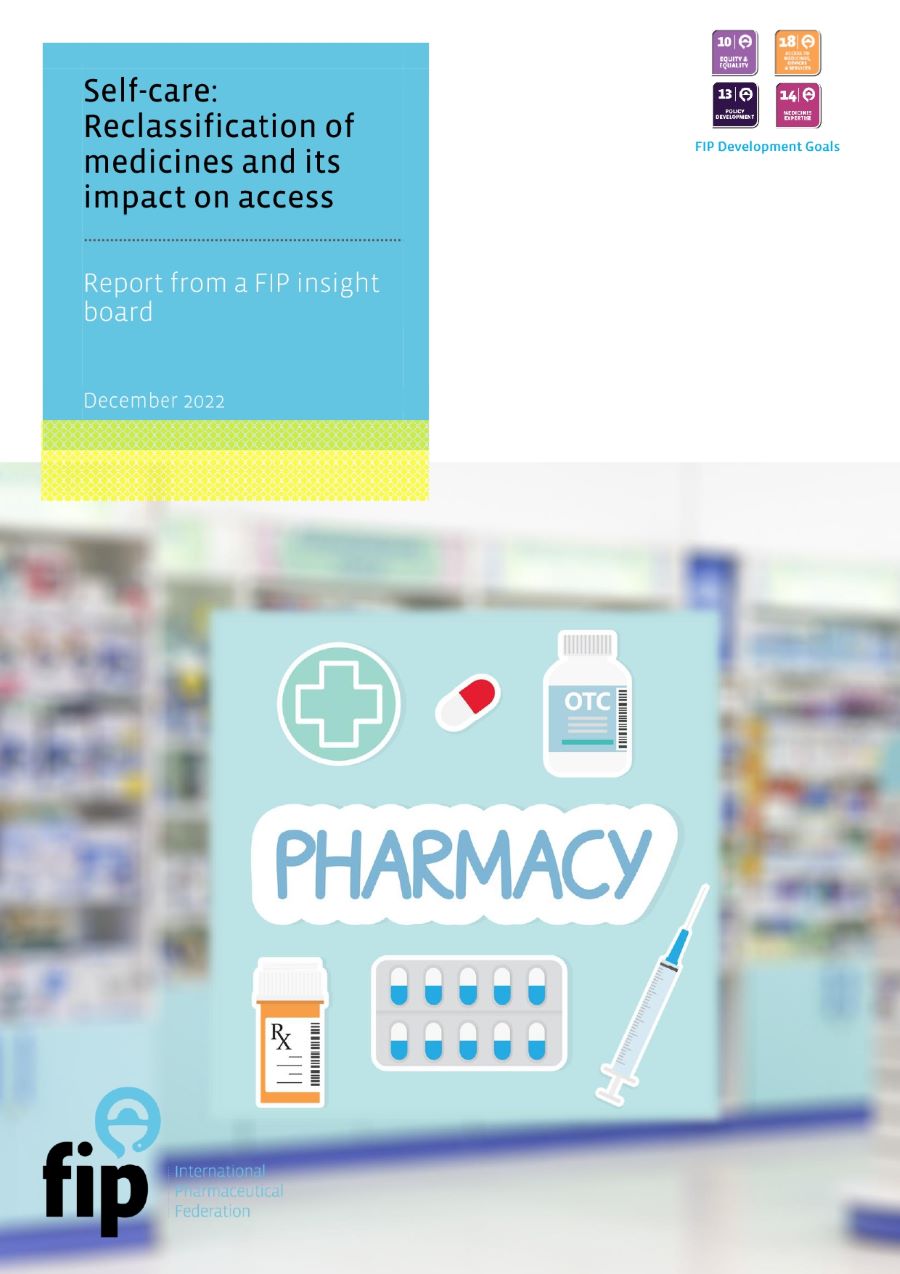
Self-care: Reclassification of medicines and its impact on access
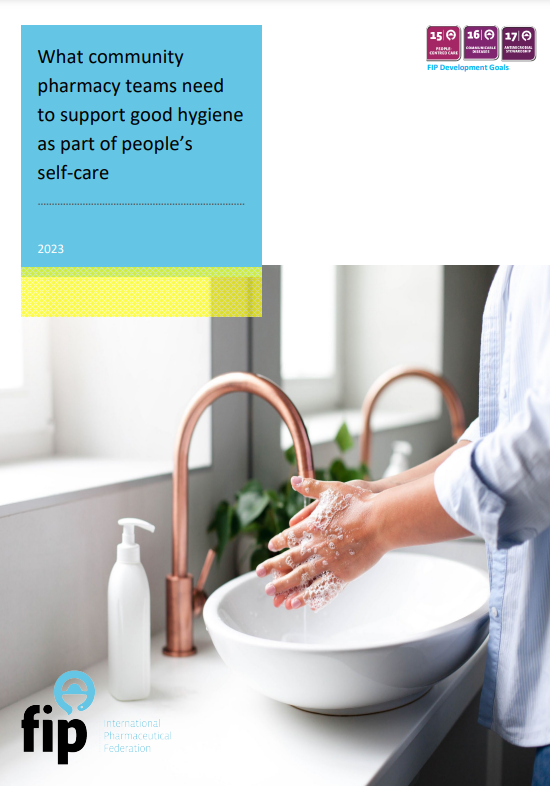
What community pharmacy teams need to support good hygiene as part of people's self-care
Self-care is often thought of as what people do for themselves to establish and maintain health, and to prevent and deal with illness. According to the World Health Organization, it is a broad concept encompassing nutrition (type and quality of food eaten), lifestyle (sporting activities, leisure etc), environmental factors (living conditions, social habits etc), socioeconomic factors (income level, cultural beliefs etc), self-medication and hygiene (general and personal). This study, which took the form of an online questionnaire, aimed to describe community pharmacy insights into hygiene and pharmacy teams’ role in addressing germ concerns of the public across India, Indonesia, Saudi Arabia, South Africa and Thailand. The findings from our literature review showed that the concept of providing hygiene care advice has been differently shaped pre- and post-COVID times. Before the COVID-19 pandemic, the area of focus was limited to oral hygiene. All studies reviewed in the literature reinforced the vital role of community pharmacists as the public’s first choice of healthcare provider in mitigating the spread of the disease as well as their prominent contribution to overall emergency management. There was also an unequivocal need to support, train and educate community pharmacists and their teams to improve their knowledge because the concept of increasing personal hygiene awareness is a focus area of community pharmacists in developed and developing countries.
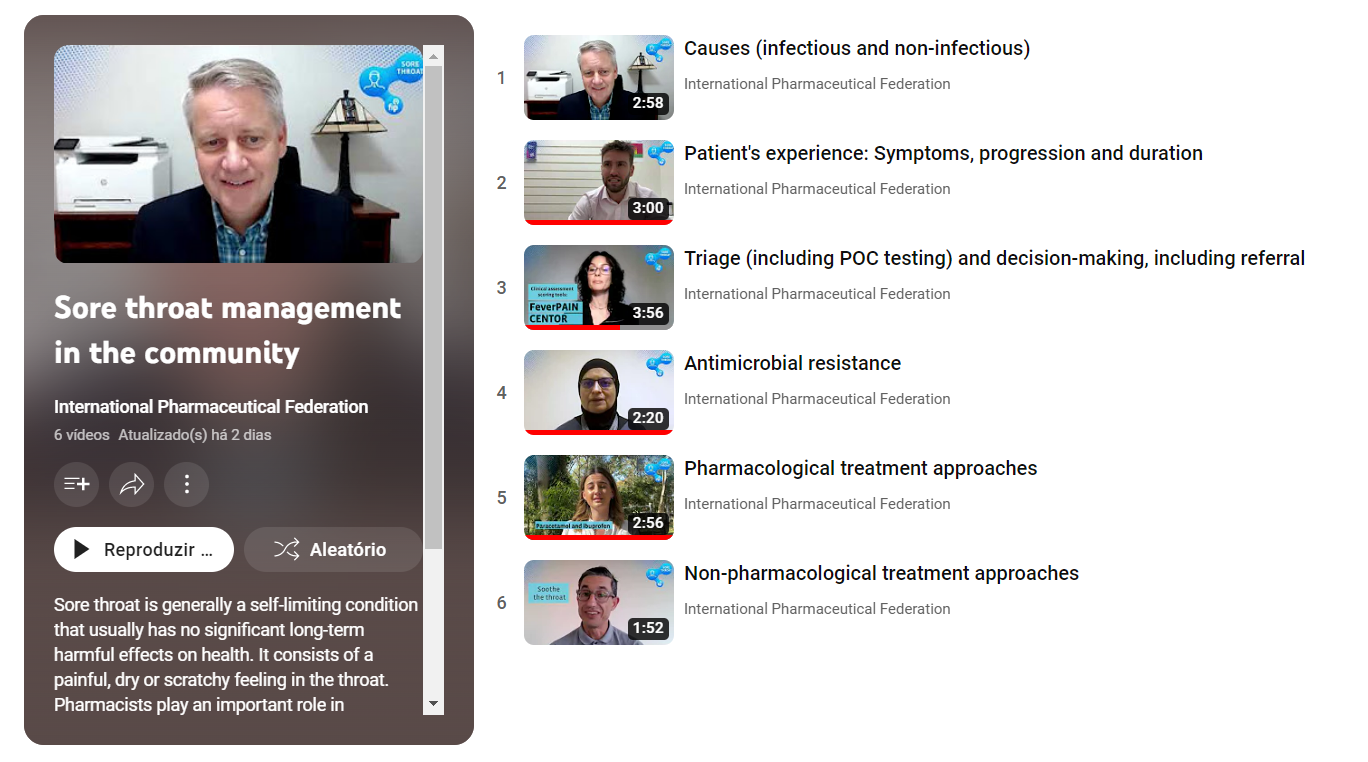
Videos: Sore throat management in the community
Sore throat is generally a self-limiting condition that usually has no significant long-term harmful effects on health. It consists of a painful, dry or scratchy feeling in the throat. Pharmacists play an important role in supporting self-care in cases of sore throat and can thus avoid patients’ unnecessary use of other healthcare resources and the unwarranted use of antimicrobials. This series includes six videos on different aspects of sore throat management, from causes and symptoms, to triage and pharmacological and non-pharmacological treatment options
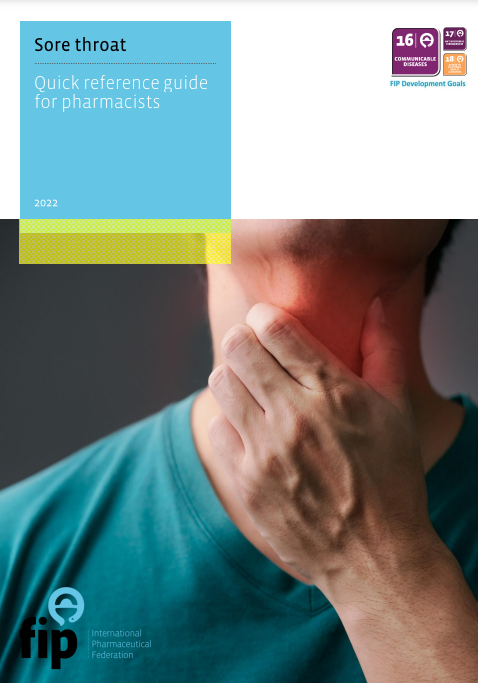
Sore throat: Quick reference guide for pharmacists
Sore throat is one of the most common upper respiratory tract infections for which antibiotics are used inappropriately. This quick reference guide covers causes, triage, and pharmacological and non-pharmacological treatments, and it provides links to further resources.
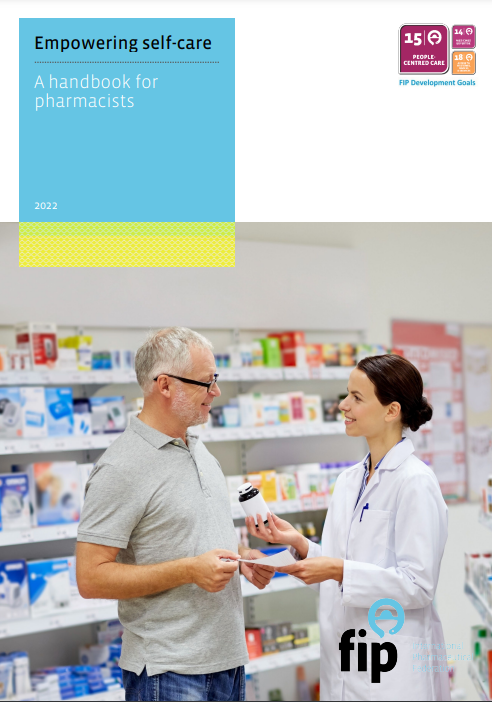
Empowering self-care: A handbook for pharmacists
This handbook aims to provide the pharmacy workforce with relevant and concise guidance on coaching practices and person-centred approaches to promoting and engaging in self-care. It discusses current trends and strategies in self-care and explores the implications, innovations and approaches adopted across several practice areas. It also aims to support and engage the frontline pharmacy workforce to overcome the barriers, challenges and realities of self-care while exploring the extent of all its potential benefits, especially those that contribute to the vision for UHC.

Pharmacy as a gateway to care: Helping people towards better health (2017)
This reference paper reviews the current state of consumer interest in health care and presents a collection of evidence of pharmacy services related to self-care and the value that pharmacists bring to health care systems in this way. It lays out the drivers of self-care and profound changes in the way health care systems operate.

Pharmacists supporting women and responsible use of medicines: Empowering informal care givers (2018)
Women are the non-professional caregivers closest to healthcare professionals and are often the ones who visit pharmacies and assume responsibilities for health in the household. In general, women tend to seek treatment and visit doctors or pharmacies (and pharmacists) more frequently than men do. It is often the woman who encourages family members to visit a healthcare professional and who makes sure they take medicines and understand the treatment. Pharmacists should support women in these emerging roles, because medicines are like a double-edged sword — of great benefit if used correctly, but capable of causing harm if used incorrectly. In this reference document, attention is paid to the fact that women as informal caregivers considerably lighten the load of the healthcare labour force, often playing a crucial and underappreciated role in providing healthcare to families and communities.

Nutrition and weight management services: A toolkit for pharmacists (2021)
The aim of this toolkit is to equip pharmacists with knowledge in general nutrition and general weight management strategies so they can play an increased role in the communities they serve and support other healthcare providers involved in their patients’ care, including general and specialist physicians, nurses, dieticians, nutritionists, dentists etc., and to be proactive in facilitating discussions about nutrition and physical activity with their patients. Pharmacists across the world are already taking steps to promote healthy lifestyles among their patients through a variety of innovative initiatives, ranging from educational campaigns to more direct patient counselling strategies and programmes.
